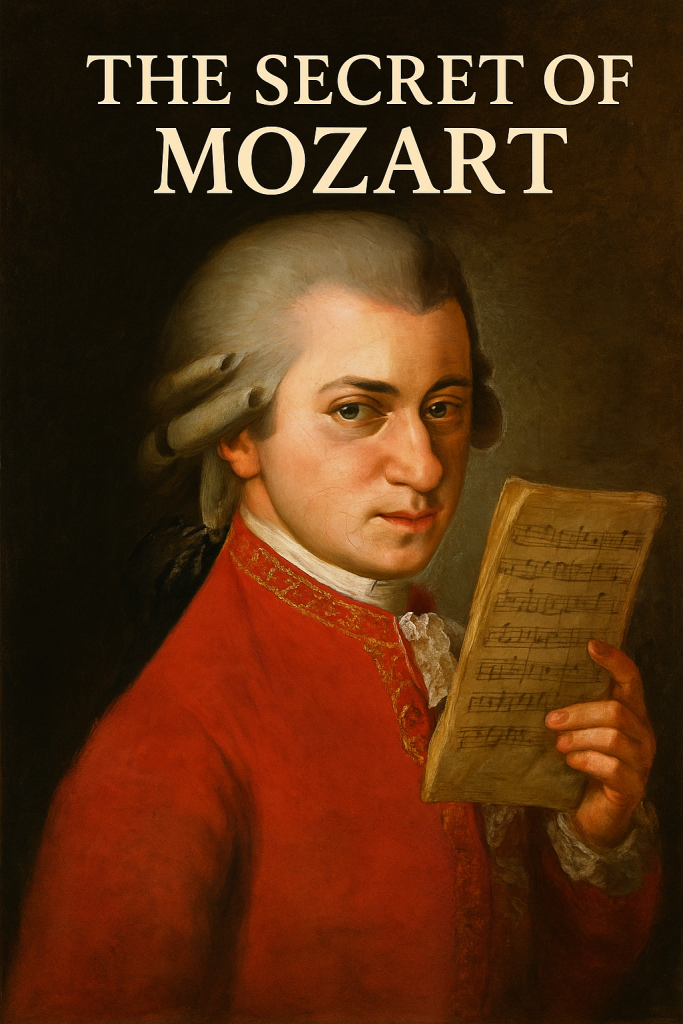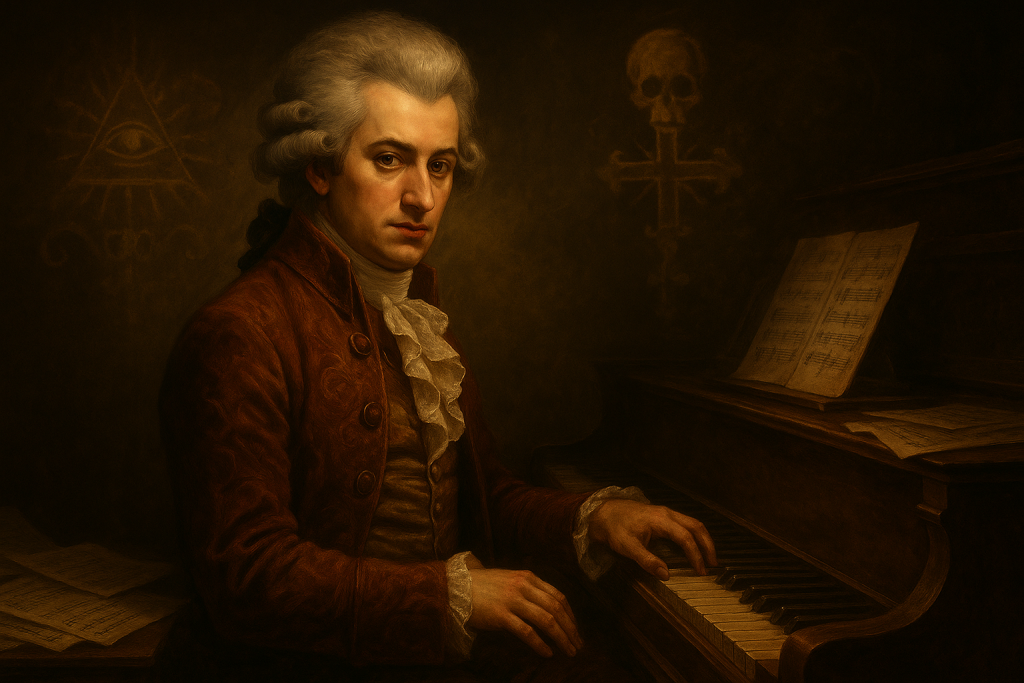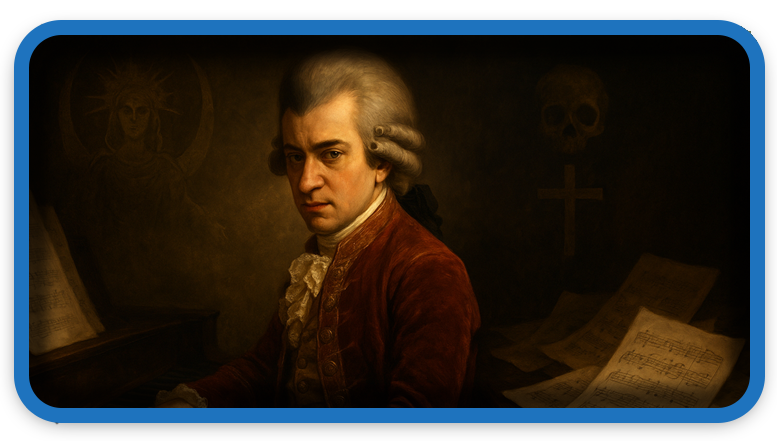⏲️ Estimated reading time: 7 min
The Secret of Mozart. The secret of Mozart lies in his genius, blending natural talent, perfect pitch, extraordinary memory, and deep emotional intelligence. This article explores the myths, mysteries, and timeless power of his music, including The Magic Flute and the Requiem.
Few figures in music history have inspired as much admiration, mystery, and legend as Wolfgang Amadeus Mozart. His life, though short only 35 years was filled with extraordinary achievements. From his earliest days, Mozart demonstrated a genius that seemed almost supernatural. Audiences, both in his time and ours, have wondered: what was the secret of Mozart?
Was it his perfect pitch? His ability to compose entire symphonies in a matter of days? His unique balance between mathematics and emotion? Or perhaps the mystical aura surrounding his unfinished Requiem?
This article explores Mozart’s secrets in detail, analyzing his talent, upbringing, creative process, and the cultural legacy that made him immortal.
Mozart’s Childhood and Early Genius
A Prodigy in the Making
Wolfgang Amadeus Mozart was born in Salzburg in 1756. By the age of 3, he could play the harpsichord with remarkable accuracy. By 5, he composed short pieces that astonished professional musicians. His childhood was not one of ordinary play, but of continuous music-making.
The Role of His Father
Leopold Mozart, his father, recognized Wolfgang’s talent immediately. A violinist, composer, and pedagogue, Leopold provided a structured education that combined strict discipline with creative freedom. Without his father’s guidance, Wolfgang’s genius might not have been polished into the brilliance we celebrate today.
Tours Across Europe
From an early age, Mozart traveled across Europe with his family. These journeys exposed him to courts, operas, and churches, allowing him to absorb diverse musical influences. In Paris, London, and Vienna, he astonished audiences with his ability to improvise, perform, and compose.
The Gift of Perfect Pitch and Memory
Perfect Pitch
One of Mozart’s most remarkable abilities was his perfect pitch the capacity to identify or reproduce any note without reference. This gift allowed him to instantly recognize and internalize music.
Memory Like a Recording Machine
Mozart’s memory bordered on the miraculous. The story of him transcribing Allegri’s Miserere after hearing it only once is legendary. This memory gave him not only the ability to recall but also to rework and improve upon what he had heard.
Instantaneous Composition
Unlike many composers who struggled through drafts, Mozart often wrote down music as if transcribing it from his mind. His compositions were clean, precise, and rarely altered. This speed made his output extraordinarily prolific.

The Mathematics of Music and Emotional Depth
Structural Perfection
Mozart’s works are often described as mathematically perfect. The balance of melody, harmony, and rhythm demonstrates a near-scientific precision. Yet his music never feels mechanical.
Emotional Resonance
What sets Mozart apart is his ability to infuse profound emotion into strict forms. His operas explore love, jealousy, betrayal, and redemption with unparalleled sensitivity. Works like Don Giovanni or The Marriage of Figaro reveal both humor and tragedy.
Simplicity and Complexity United
Mozart’s true secret may be his ability to make the complex sound simple. His music feels natural, flowing like speech, while concealing extraordinary sophistication beneath the surface.
The Mystical Secrets: The Magic Flute and the Requiem
The Magic Flute – A Masonic Allegory
Composed in 1791, The Magic Flute is rich with Masonic symbolism. Mozart, a Freemason himself, embedded themes of initiation, enlightenment, and brotherhood. Characters like Sarastro and the Queen of the Night represent light and darkness, reason and chaos.
The opera is not merely entertainment it is a spiritual allegory, a coded message about human transformation.
The Requiem – Writing His Own Death?
Perhaps the most enduring mystery is Mozart’s Requiem. Commissioned by a mysterious messenger in gray (who turned out to be an agent for Count Franz von Walsegg), the work remained unfinished at Mozart’s death.
Rumors spread that Mozart felt he was writing his own funeral mass. This legend, combined with the haunting beauty of the music, has immortalized the Requiem as one of the most powerful works in history.
The Legend of Poisoning
Some have speculated that Mozart was poisoned, perhaps by jealous rivals like Salieri. Though historians generally reject this theory, the myth contributes to the aura of mystery surrounding his final works.
Mozart’s Creative Process
Music in His Head
Letters from Mozart reveal that he often “heard” an entire piece in his mind before writing it down. He described music flowing into him as if from another world.
Composing Quickly and Efficiently
Unlike Beethoven, who filled notebooks with drafts and corrections, Mozart’s scores appear polished from the start. This efficiency was both his gift and his curse it gave him fame, but also led others to underestimate the effort behind his genius.
Inspiration in Daily Life
Mozart did not always require silence or solitude. He could compose while traveling, surrounded by noise, or even while playing billiards. His creativity seemed ever-present, unstoppable.
The Human Side of Mozart
Joy and Humor
Despite the divine quality of his music, Mozart was very human. He loved jokes, playful word games, and even crude humor. His letters reveal a mischievous, sometimes childish side.
Struggles and Poverty
Though adored for his talent, Mozart often struggled financially. He lacked the business sense of some contemporaries and frequently lived beyond his means. Yet even in hardship, his music radiated light.
Relationships and Love
Mozart married Constanze Weber, a singer who supported his career. Though their marriage faced challenges, Constanze played a crucial role in preserving and promoting his works after his death.

The Legacy of Mozart
Eternal Influence
Mozart’s music influenced countless composers, from Beethoven to Tchaikovsky. His mastery of form, melody, and expression set the standard for classical music.
A Universal Language
What makes Mozart timeless is his ability to speak to all generations. His music transcends cultural and linguistic barriers, resonating with anyone who listens.
The Secret in the Soul
Perhaps the true secret of Mozart is not technical at all it is his ability to capture the human soul. His music reflects our deepest joys and sorrows, making us feel both the fragility and the beauty of life.
Beyond the Myths: What We Can Learn
- Discipline and Passion Must Coexist: Mozart combined natural genius with relentless practice.
- Balance Matters: His music shows the harmony between reason and emotion.
- Legacy Is Built on Meaning: Mozart’s works endure not because they are clever, but because they speak to the human condition.
🔔For more tutorials like this, consider subscribing to our blog.
📩 Do you have questions or suggestions? Leave a comment or contact us!
🏷️ Tags: Mozart, Classical Music, Requiem, The Magic Flute, Perfect Pitch, Musical Genius, Vienna, Opera, Freemasonry, Music History
📢 Hashtags: #Mozart #MusicGenius #ClassicalMusic #Requiem #TheMagicFlute #Opera #Vienna #Freemasonry #MusicHistory #WolfgangAmadeusMozart
Final Thoughts
The secret of Mozart is not a single mystery to be solved, but a combination of natural gift, early training, extraordinary memory, and a unique blend of mathematical precision and emotional depth. His life may have been short, but his art is eternal.
In every note, Mozart whispers to us across centuries. He reminds us that beauty and truth can coexist, that music can speak the language of the soul, and that genius, though rare, leaves a mark that time cannot erase.
Only logged-in users can submit reports.
Discover more from HelpZone
Subscribe to get the latest posts sent to your email.

